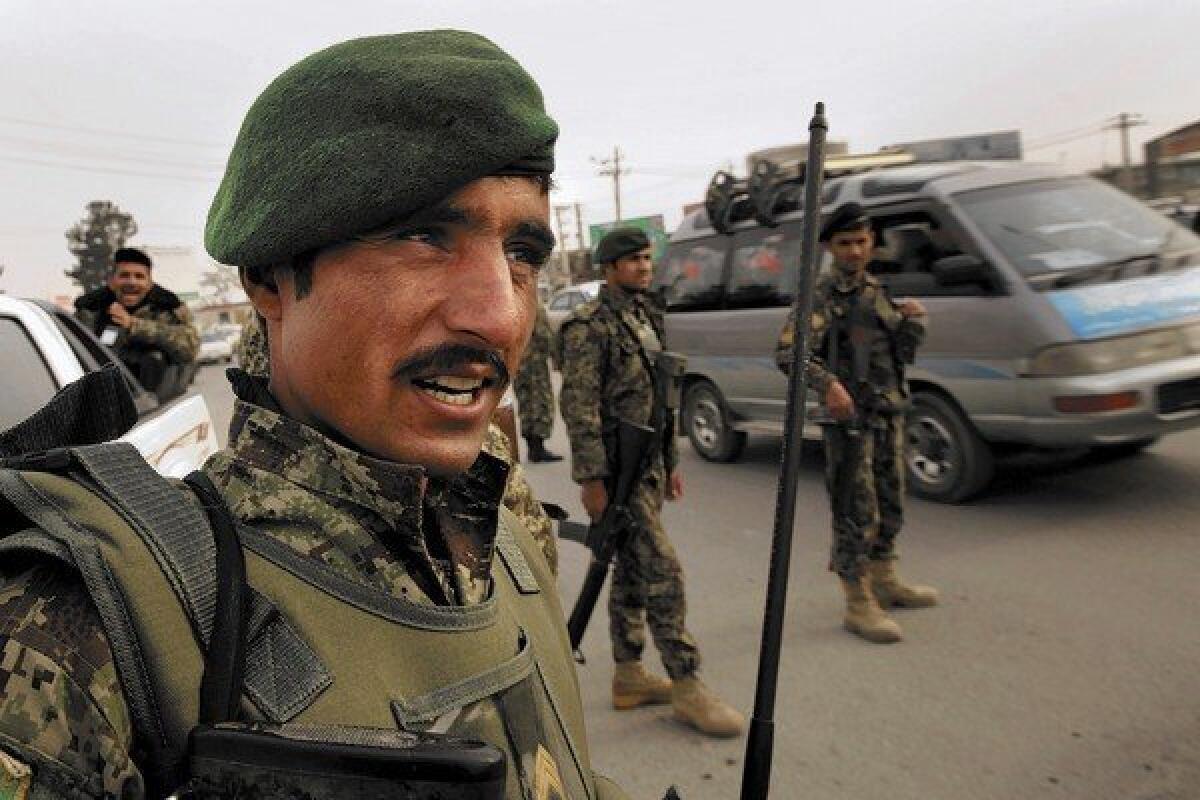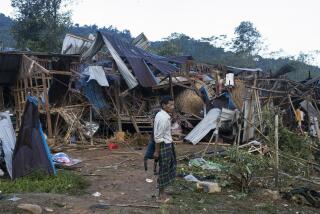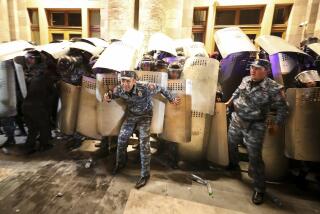In remote Afghan areas, cease-fires catching on

KABUL, Afghanistan — Formal peace talks between Taliban insurgents and the central government may be at a dead end, but provisional peace negotiations are underway in the rugged and often unforgiving Afghan countryside.
In some remote districts, Afghan army and police commanders have agreed to cease-fires with local Taliban commanders, according to international coalition officials, diplomats and former top Afghan government advisors. Driven by tribal and sometimes family ties, these informal accommodations are viewed as a possible blueprint for a wider, more meaningful national peace deal after 12 years of war.
In many instances, former top Afghan government security advisors say, the Taliban is under intense pressure from tribes fed up with the militants’ roadside bombings and intimidation of villagers. In other instances, local Afghan military commanders seek to buy time and immobilize the Taliban while receiving more training and equipment from U.S. military advisors.
Tribal authorities are central figures in negotiating the cease-fires, which can last for weeks or even months. Tribal elders often have ethnic or family ties both to local Taliban commanders and Afghan army officers. They are trusted by both sides, and can ensure that everyone abides by the cease-fires.
U.S. military commanders have long said that the grinding war in Afghanistan will not end with a battlefield victory. A negotiated peace settlement is the only solution, they say, and local cease-fires may — or may not — provide a path forward on the national level.
“We never wanted to see the Afghan security forces try to fight the Taliban to the last man,” a senior coalition commander said in an interview. He said cease-fires may “in some cases be an indicator of things to come.”
Local cease-fires have accelerated in recent months as the Afghan National Security Forces, or ANSF, have taken over combat duties from U.S. and international troops. With Afghans now in the lead, they have more leeway to negotiate with insurgents.
“I think anything which involves Afghan military commanders making judgments of the situation that is presented to them has to be a positive thing,” said British Army Brig. Neil Marshall, who directs Afghan security force training for the International Security Assistance Force, or ISAF.
Marshall emphasized that ISAF does not get involved in cease-fires, or deal with the issue as part of its “advise, train and assist” mission. He said Afghan commanders “understand the human terrain” and make accommodations with insurgents aimed at protecting civilian lives and ensuring freedom of movement.
In a report to Congress last month, the Pentagon said “highly localized” cease-fires are most common in the Taliban-dominated south, particularly in the northern part of Helmand province. A former top advisor to Afghan President Hamid Karzai described other cease-fires in Khowst province near the Pakistani border.
“These accommodations are localized, often personality-driven and largely influenced by tribal dynamics,” the Pentagon report says.
In some cases, cease-fires may reflect Afghan security force fear of “being isolated and overwhelmed by what they perceive as a superior insurgent force,” the report says. In other instances, it says, “some local insurgent commanders may also be entering into agreements in recognition of ANSF strength and capability.”
A year ago, an ISAF consultant predicted in a study that local cease-fires would become more common after foreign combat troops withdraw next year.
“Survival by all sides, including the insurgency, will drive this highly decentralized process,” says the study, “Cease-Fire Toward 2015.” The study notes that Islamic-sanctioned cease-fires date to 628: A peace treaty between the prophet Muhammad and the Quraysh tribe of Mecca allowed his followers to safely make a pilgrimage to Mecca.
“Cease-fires between local ANSF and [insurgents] should be permitted and perhaps at times encouraged, provided they do not relinquish our core moral and national security responsibilities,” the ISAF study says.
It adds, “Deep uncertainties about the future will force all Afghans to resort to their historic practice of establishing a cease-fire to buy time and assess the new environment.”
Although the cease-fires are informal, they are not considered entirely unofficial because “such agreements tend to be culturally binding for honor and other reasons,” the study concludes.
Twelve years of war have worn down both insurgents and Afghan forces, with high casualties on both sides last summer, according to two former government advisors. The war has settled into a stalemate; the U.S.-backed national government controls Kabul and other major cities, and the Taliban operates shadow government systems and courts based on sharia, or Islamic law, in villages and the countryside, especially in the south and east.
“Both sides are weary and realize that at some point we have to reach an end game,” said a Western diplomat in Kabul, the Afghan capital. “That’s providing momentum for these local accommodations.”
A former top security advisor to Karzai who still meets with the Afghan president said some cease-fires stabilized rural areas after tribal leaders confronted Taliban commanders who had arrived from elsewhere and intimidated villagers.
“The locals are like anyone else — they want their kids to go to school without being blown up. They want to farm their fields without hitting IEDs,” or booby-trapped insurgent bombs, he said.
At the same time, the former advisor said, villagers resent American-led night raids and air attacks aimed at insurgents, which have sometimes caused civilian deaths. They are tired of tough security sweeps of villages by Afghan soldiers and police. Elders resolve the problems by negotiating with both sides.
“It’s the Afghan way — you negotiate for the benefit of all,” the former advisor said. “Normal life gets better, things stabilize locally.”
Since invading Afghanistan in 2001 after the Sept. 11 attacks planned by Al Qaeda on Afghan soil, the U.S. has sought to build a viable national government to prevent the country from again become a launching pad for terrorist attacks.
Rampant government corruption and incompetence have enabled the Taliban to dominate much of the rural south and east, even after more than $96 billion in U.S. development aid and billions more spent on the army and police.
Yet because Afghan forces held their own against the Taliban during their first solo summer fighting season this year, cease-fires could provide an opportunity for the government.
In certain cases, Taliban commanders from the outside agree to move away, while militants stay put and lie low. But the central government has generally not taken advantage of the relative calm in order to provide effective local governance or money for roads, clinics or schools, according to two former government advisors.
Conflicts in rural areas often involve more than just Afghan security forces battling the Taliban. Fighting also breaks out over water and land disputes, which bleed into the larger war, making lasting local peace deals more difficult.
Even so, one former Afghan government advisor said, “with everybody so tired of war, these accommodations should be encouraged.”
On the national level, Karzai demanded last month that the U.S. be more directly involved in nascent peace negotiations with the Taliban. Preliminary peace talks collapsed in June.
Some Afghan politicians say Karzai’s adamant refusal to sign a proposed 10-year security agreement with the United States stems in part from a desire to bring the Taliban into negotiations by appearing to stand tough against Americans.
If the Afghan army and police continue to show slow but steady improvement, the senior ISAF commander said, cease-fires could play to their strength.
“At some point the leadership of the Taliban are going to realize they aren’t going to be able to win this militarily,” he said. “At some point there is going to have to be a settlement of some kind.”
More to Read
Start your day right
Sign up for Essential California for news, features and recommendations from the L.A. Times and beyond in your inbox six days a week.
You may occasionally receive promotional content from the Los Angeles Times.







